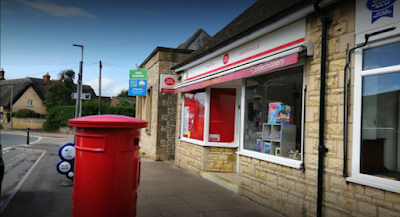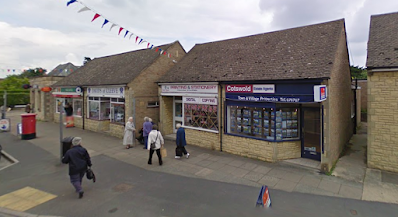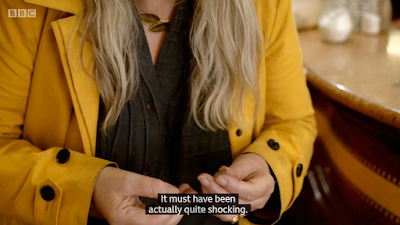08:00 An early start for Lois and me because we're planning to risk one of our rare adventures of actually going inside a shop, in this case the Post Office at Bishops Cleeve.
Bishops Cleeve Post Office
Lois is sending a gift of some sort of baby clothes to the parents of a new-born baby, and we're also sending 6 paperback books to Lily and Jessie, our twin granddaughters in Perth, Australia: children's books that their mother, our daughter Sarah, read and loved when she was their age.
Awww - that's sweet, isn't it!
The post office is open from 8am to 5pm, Monday through Saturday, but we decide not to leave it too late unless COVID restrictions mean that the queue may be snaking down the street. We hate snaking!
There have recently been calls by local residents for the post office to extend its opening hours. People around here have read on Onion News that the Post Offices in the US have extended their hours to 3am, which has made Bishops Cleevians a little restive. But the post office here has stolidly refused to follow this recent trend.

10:00 We get ourselves ready and make a start on the 3-mile 7-minute journey. We're becoming bolder and this is our latest little adventure after all !
some of the possible routes we could take to get to the Post Office -
we pick the quick one - 7 minutes: call us crazed petrol-heads if you like!!
[All right I will ! - Ed]
We take masks and hand gel with us, but, as it turns out, the slits (or slots) in the pillar box outside the shop on the pavement (see photo above) are generous enough for us to get all 3 parcels into it, so we don't have to step inside the actual post office - phew!
But the masks aren't wasted because Lois decides we should call in at the Estate Agents just up the street and ask about houses for sale. Our daughter Sarah is half thinking of moving back to the UK after nearly 6 years down under - she and Francis may want to buy our house, in which case Lois and I will have to find somewhere to move to ourselves.
Cotswold Estate Agents, where we call in to see about what
properties are for sale in the area, in case we have to move out
of our house, if Sarah wants to move back to the UK from Australia
11:00 We come back home and have a cup of coffee and a biscuit on the couch. I look at my smartphone and I see that our younger daughter Sarah has had her first coronavirus jab in Perth today. She was due to have it a few weeks ago, but had to postpone because of a heavy cold.
a happy Sarah after getting her jab earlier today
The Aussies are way behind us in terms of getting their population vaccinated, so it's nice to hear that Sarah has at least started on the process. The country was relying on its geographical remoteness and strict border controls, and another complicated factor was that the population was panicked initially into rejecting astrazeneca.
What madness !!!!!
11:00 I continue to look at my smartphone. Gill, my sister in Cambridge, has been visiting the Cambridge University Botanic Gardens and has posted a couple of charming photos of herself and husband Peter up on social media, which is nice.
Peter and Gill at the Cambridge University Botanic Gardens
Gill's pictures bring back happy memories for Lois and me because we visited the gardens in May 2015 before visiting Gill and Peter to celebrate their 30th wedding anniversary at their home in the Cherry Hinton area of Cambridge.
flashback to May 2015: Lois and I visit the Cambridge University
Botanic Gardens
Later we joined Gill and Peter at their home to celebrate their
30th wedding anniversary in company with their 3 daughters and
their partners and friends - happy times !!!!
14:30 Lois and I run a U3A Danish Group, the only one in the UK, and today is its fortnightly meeting. There's a lot of chat (in English) and not much Danish, but we manage to do another 5 pages of the Danish crime novel that is the group's current project.

a typical dark scene from a Nordic noir crime story
(not the one we're doing)
16:00 The meeting ends and, as usual, Lois and I feel totally drained. Luckily we've got some left-over minced beef to eat tonight with a baked potato, which won't take a lot of preparation, that's for sure.
I think we must be getting old - no doubt about that !! {I can't believe you've only just noticed that! - Ed]
20:00 Another day has passed without me doing a single second of work on my so-called "presentation" that I'm supposed to be giving on zoom in 8 days' time, for Lynda's U3A Middle English group: all about the influence of the Scandinavian languages on the history of English.
Too late to do any work now, I feel completely drained. I'll have to try and do better tomorrow, although tomorrow and Saturday's agendas are already filling up with tasks - damn!
We settle down on the couch and watch a bit of TV, an interesting documentary by historian Mary Beard all about Julius Caesar.
I got an A-Level in Ancient History in the 1960's, so I find that I know a lot of the stuff in this programme. But I do pick up one or two things. "Crossing the Rubicon" is a famous phrase in English, and is what Caesar did when he brought his army into Rome for the staging of his military coup d'état.
In the halcyon democratic days of the Roman Republic, generals were supposed to keep their armies out of the area immediately around the city of Rome. Caesar's crossing of the Rubicon stream was the sign that he's was taking a very significant, irrevocable step towards ending that democracy.
I didn't know, or had forgotten, that nobody is really sure where the Rubicon is. I think Mussolini had a guess, and found a stream he thought might be it, and labelled it as such, but the ident is not a cast-iron certainty.
Also Lois and I didn't realise that Caesar was the first ruler in the western world to think of putting his face on the coinage, something he used as a potent weapon in establishing his authority.
I notice that Mary qualifies this by saying "in the West" - I don't know if that means the Chinese, say, or the Babylonians maybe, had done it already. But I think we should be told !
It's a disturbing fact that although the intelligentsia were not happy with Caesar usurping power and destroying the democratic safeguards of the old Republic, the ordinary people loved him. He was seen as the anti-establishment candidate, not part of the Roman metropolitan elite. And he knew the value of keeping his supporters happy.
I'm trying to think which modern leaders most remind me of this - unfortunately these days, there are quite a few possible answers for this question. I know that one of the promises Caesar made to the public was that he would "drain the swamp", and do it literally: Rome is surrounded by swampy ground. Oh dear!!!
22:00 We go to bed - zzzzzzz!!!!!




















No comments:
Post a Comment